
Centre of Jaina Studies Newsletter: SOAS - University of London
Hardly anything is known about the life of one of the pioneers of Jaina Studies in the 20th century: Dr Robert Hamilton Blair Williams, born 21.8.1915 in Buckland, East Tilbury, Essex, deceased at an unknown location in 1975. His second book Jaina Yoga: A Survey of the Medieval Śrāvakācāras became highly influential, particularly after the advent of field studies of the religious culture of Jaina laity in the 1980s, and is now widely used in research and teaching. In two brief obituary notes published by The Times in 1975, which are now virtually inaccessible, even the dates and places of his birth and death are not recorded. Regrettably, no details of his biography are traceable as yet which could elucidate the personal motives which informed his own or his academic teachers' interest in the Jaina tradition, the study of which preoccupied him throughout his brief career at SOAS. Some of the few biographical traces that are preserved in the archives of SOAS[1] and the British Library[2] are presented in the following through his own and the voices of his contemporaries.
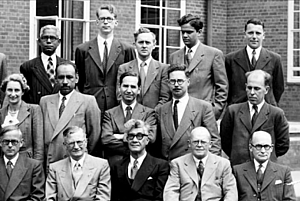
Robert Hamilton Blair Williams (1915-1975) is standing at the end of the centre row in this detail of a SOAS staff photograph taken in June 1953. This is the only known photograph in which he appears. Photo: Panora Ltd. © School of Oriental and African Studies
Robert H.B. Williams's life story is remarkable in many respects. Not least, because he was the only ever 'Teacher of Indo-Aryan and Jaina Studies' at the University of London, School of Oriental and African Studiesa position still unique anywhere in the world, except for India, which he held for only a few weeks in the year 1962.[3] Although he was a lecturer at SOAS for only eight years in total (1949-1953, 1958-1962), he had a long relationship to the School. From 1935 to 1938 he was a graduate student of Sanskrit and Pali under the historical linguist Sir Ralph Lilley Turner (1888-1983), Director of SOAS 1937-1957. Williams' studies also included three years of Hindustani under University Reader Dr T. Grahame Bailey, financed through the Ouseley Scholarship for Hindustani. He completed his studies with a BA First Class Honours in Indo-Aryan, Although Turner continued to tutor him in Prakrit,[4] in 1939 Williams's studies at SOAS were interrupted by what was to become a career of eleven years as Assistant Keeper at the Indian Office Library (1939-1946, 19541957). This included six years 'on loan' for service in Army Intelligence during WWII, for which he volunteered (1940-1945).[5] He then spent a further twelve months 'on loan' to the Ministry of Works and Buildings (19451946), where he apparently stayed on for a few more years.[6] After WWII, in 1949, Turner enticed Williams, who found himself no longer fit for academic life, back to SOAS to accept the position of 'Lecturer, Section B, in Indo-Aryan' in the Department of India, Pakistan and Ceylon under Professor John Brough (1917-1984).[7] Williams held this position from 1949-1953, and during this period completed his PhD thesis: A Critical Edition of the Jaina Prakrit Text Muṇivaicariyaṃ, which was published in revised and expanded form in 1959 under the title Two Prakrit Verses of the Maṇipati-Carita (the common form Munipaticarita was shown to be wrong). At the time, Turner clearly regarded Williams as his principal disciple, as testified by his response to Williams's resignation letter of 22 June 1953, near the end of his first period as lecturer at SOAS, which had already been extended by the Department from 1953-1956:
Fate has been unkind to me in taking away the one English pupil of mine who I had so hoped would follow up my own work.
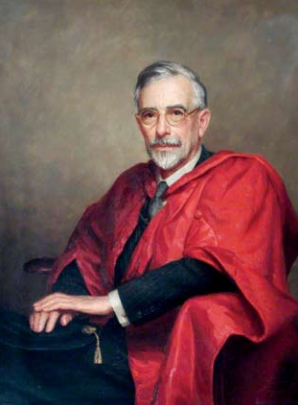
Sir Ralph Lilley Turner (1888-1983), SOAS Director (1937-1957) By Leonard Boden Oil on canvas, 89 x 70 cm Collection: School of Oriental and African Studies © School of Oriental and African Studies
Williams had set his mind on an administrative post at the UN in New York, which he took up from 1953 to 1954. In a letter to Turner, he maintained that this had been for financial reasons only. In 1954 he returned to the UK to re-join the India Office Library as Assistant Keeper, since this would enable him to take care of his mother after the sudden demise of his father in July 1953:
The work here at the U.N. is trivial and monotonous and the conditions of life in New York far from pleasant. Even were they different I could never adapt myself to this country where only financial considerations retain me. As soon as they allow I want to return to England (Williams 12.2.1954).
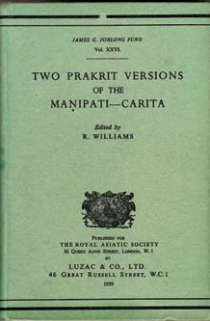
Williams, Robert Hamilton Blair. A Critical Edition of the Jaina Prakrit Text Muṇivaicariyaṃ, with Translation and Grammatical Notes. Thesis (PhD). University of London, 1951.
-'Introduction'. 'Index'. In: A.A. Menon. Catalogue of the Malayalam Manuscripts in the India Office Library. London: Oxford University Press, 1954.
-Two Prakrit Versions of the Maṇipati-Carita. London: Luzac & Co. for the Royal Asiatic Society, 1959 (James G. Forlong Fund 24).
-Jaina Yoga: A Survey of the Medieval Śrāvakācāras. London: Oxford University Press, 1963 (SOAS London Oriental Series 14) (Reprint: Motilal Banarsidas 1983).
-'Haribhadra'. Bulletin of the School of Oriental and African Studies 28, 1 (1965) 101-111.
-'Before Mahāvīra'. Journal of the Royal Asiatic Society of Great Britain and Ireland (1966) 2-6.
-'Accounts of the Jainas taken from Sixteenth and Seventeenth Century Authors'. Mahāvīra and his Teachings. Ed. A. N. Upadhye et al., 259-266. Bombay: Bhagavān Mahāvīra 2500th Nirvāṇa Mahotsava Samiti, 1977.
Although he was able to complete the late C.A. Menon's Catalogue of the Malayalam Manuscripts in the India Office Library in 1954, editorial work which he had started in 1951, with permission of SOAS, Williams was evidently not satisfied with the work at the Indian Office Library. In 1955/56 he applied unsuccessfully for the Headship of the Department of Indian Studies at the University of Malaya, and in 1957 for the post of Keeper at the British Museum. He wrote to his mentor Turner, again, in desperation:[8]
I must recognise that I am a very poor teacher. As any post which I might occupy would be primarily one of research that is perhaps not of critical importance. The other is a question of attitude. You once said to meand the phrase impressed me profoundlythat for the academic life one should have a sense of vocation. That I have not got. In the last few years I devoted myself entirely to Indian studies, deliberately killing every other interest, but those studies represent only a substitute for what I would have sought, something to cover the bankruptcy of my life. With self-discipline I think I can do good work but the inner satisfaction is lacking. You know how much I desire to leave the Indian Office Library and in particular how dearly I would like to return to the School if only to retrieve my own reputation but I felt I had to say this (Williams 14.7.1957).
Finally, on recommendation of Turner, Brough offered him a second three-year lectureship at his department, now as 'Lecturer, Section A, in Prakrit'. During this probation period (1958-1960) Williams published his PhD thesis, and started his now famed work on Jaina lay ethics and ritual on the basis of more than fifty predominantly Sanskrit printed texts available in the India Office Library. After his re-appointment as full time 'Lecturer in Prakrit', commencing on 1 January 1961, he completed this work in June.[9] It was published in 1963 under the somewhat deceptive title Jaina Yoga, because structure and content of the text was inspired by Hemacandrācārya's celebrated 11th-century work Yogaśāstra. Although Brough, like most European Indologists, did not think very highly of the literary value of Jaina texts, in general,[10] he foresaw the significance of Williams's Jaina Yoga in his recommendation for publication in the SOAS Oriental Series: 'I have seen the typescript of this work and in my opinion it is a book which will be of great importance for future studies of Jainism'.
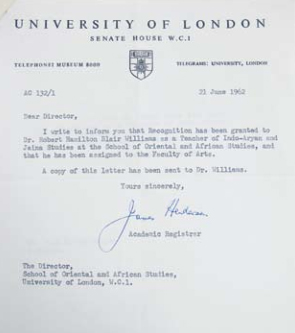
Due to chronic migraine, only one year after completing his book and securing a full time lectureship at SOAS, fifty days after his formal recognition as 'Teacher of the University of London' on 21 June 1962, Williams resigned his position on 10 August 1962, aged 47, and spent the remaining thirteen years of his life in early retirement. The only known photographic representation of Williams is found on the official 1953 staff photograph of SOAS.
Robert Williams was plagued by a history of ill health, in particular by problems with his eyesight. However, during periods of good health, after his retirement, he regained optimism, and started to work on a new project on Jaina iconography and temple ritual.[11] This innovative re-direction of research anticipated developments which became dominant in the field only two decades later. Sadly, Williams's literary remains have not survived, and nothing of his research in Jaina iconography and ritual was ever published. However, three short articles, related to previous work on Jaina śrāvakācārya literature, appeared after 1963. In 1967, Williams briefly considered applying for academic positions in America. In his unsolicited letter of recommendation (10.1.1967), Brough found the following words of praise:
He is a very shy person and not at his best in lecturing to a large audience, but a good teacher where he has only a small number of students round a table. I have a very high regard for his scholarship: he is well versed in Sanskrit and Middle Indian and reads fluently several of the modern Indian languages, including Tamil. His main research interest in recent years has concentrated on Jainism, and I think it is hardly an exaggeration to say that he is by now the leading authority on Jainism in Western Europe.
In 1975 a brief obituary note by SOAS Emeritus Professor J.C. Wright, a former student and colleague of his, highlighting Williams's academic achievements, was published anonymously in The Times:
Robert Williams, an Indologist and linguist of outstanding ability and exceptional range, died suddenly abroad last week at the age of 60. It was, however, in 1962 that his professional academic career as Assistant Keeper in the Library of the Indian Office (1938-9, 1954-57) and Lecturer in Indo-Aryan and Jaina Studies (1949-53, 195762)at the School of Oriental and African Studies, University of London, was tragically cut short by a severe affliction of the nature of migraine. He leaves a wife, Inès, and a step-daughter Ghislaine.[12] He is remembered by his teachers as a scholar from Palmer's School, Grays, Essex, who in the space of four remarkable years not only took First Class Honours in Sanskrit with Pali, held the Ouseley Scholarship in Hindustani and studied Prakrit at the School of Oriental Studies, but also edited an excellently produced Catalogue of Malayalam Manuscripts while studying Tamil to meet the exigencies of his post in the India Office Library. Despite a once privately confessed conviction that he was utterly without vocation as a teacher, he is remembered by his students as a first-rate academic tutor who simply expected, and received as a matter of course, dedication. His achievement is a pioneering contribution to the study of the secular and religious literature of the Jains, the only such contribution ever made by a British scholar and one which tended to establish him as a leading authority on the subject in Western Europe.
His doctoral study and translation of Maṇipaticarita (1951; Forlong Fund Series, 1959), based on a unique evaluation of Prakrit and Gujarati versions of these popular tales, are of great interest for the comparative study of folklore. In Jaina Yoga, published in the School's London Oriental Series (1963), he examined some fifty classical and mediaeval works on the rules of conduct for Jain laymen and the life of the community. Here he brought to the controversies prevalent in India, in the words of an Indian critic, 'deep insight, seldom noticed in the views of the contending Jaina scholars, into the canonical background of the corpus of the lay doctrine'. Since his recovery, Williams's research had been devoted to puja, i.e., to the structure, ritual, and iconology of the temples of the Jains.
Robert Williams was a research scholar. His short periods of work on the Malayam and Tamil collections were of inestimable value to the India Office Library; but he had little sympathy for library routine and policy. His utter dependability and sense of duty made him, after the war had disrupted his career, for some time a valued civil servant at home and with the United Nations; but he found the life 'trivial and monotonous'. Though he was entirely devoid of worldly ambition, his abilities were of the very highest order.
One might deplore the excessive dedication to research and the excessive diffidence and sense of duty which fragmented his career: one should probably instead realize that his lonely and supremely confident mastery of the last remaining really arcane oriental literature was a task more than human. He was unusually shy and reticent, but he won respect for British scholarship among Jaina scholars. Those who were fortunate enough to be able to engage him in conversation were aware of the great range of his intellectual interests, the interests which dominated his life.
Wright's was followed up by an additional obituary note by Nicolas de Watteville, published by The Times on 24 November 1975, which throws further light on Williams' personality and praises his eccentricity:
As a close personal friend of Dr Williams, I would like to add a few remarks to your admirable obituary notice. This notice rightly stresses the profundity of his academic knowledge and hints at the many facets of his personality. He was a man of vast erudition in the history, the art, and the architecture of many civilizations. He was a fine conversationalist and a man of wit and generosity, totally devoid of interest in personal comfort and appearance.
There is one aspect of his character not referred to in your notice. Mr Stanley Sutton, formerly Director of the India Office Library and Records, writes:'Williams had remarkable linguistic gifts, for in addition to a profound knowledge of Indian linguistics, ancient and modern, he had an extraordinary mastery of the languages of Europe. Once asked how many he could read, for a moment he was at a loss to reply. Then, with genuine modesty he explained that he could not read Basque, Finnish, or Hungarian, but could manage most of the others.'
It was this knowledge of European languages that determined Robert Williams's career in the last war. Having volunteered for Army Intelligence work he was granted an immediate commission and spent most of the war-time years as head of the East European Section of the Monitoring Service at GHQ Middle East. During these years in Cairo he acquired a profound knowledge of Arabic, both Classic and colloquial. He scarcely led the life conventional to a British Army Officer, choosing to live much of the time in a seedy suburb rather than a smart one and travelling to work on a local tram rather than on a GHQ bus. His eccentricity and appearance were something of a legend in war-time Cairo. His absentmindedness regarding the correct accoutrements of military attire led to him being sent for by the GOC. 'Major Williams', the enraged General said, 'you are entirely unfitted to hold the King's Commission.' 'Yes Sir', Williams replied, 'I am well aware of that fact.' Fortunately, the General was so disarmed by his personality that he was given permanent permission to wear civilian clothes. In later years his extremely bizarre appearance was in marked contrast to his extremely elegant wife. He was a true eccentric and a most remarkable man.
References
Bollée, Willem B. 'Glossary of Robert Williams, Jaina Yoga'. International Journal of Jaina Studies 4, 3 (2008) 1-53.
Brough, John. Report on the Maṇipati-Carita by Dr. Robert H.B. Williams. Duplicate Letter to the Publishers, Typescript c. 1958/9.
'Statement by the Head of Department'. Application for Recognition as A Teacher of the University by R.H.B. Williams 21.2.1962.
Letter to Professor D.H.H. Ingalls, Widener 273, Harvard University, 10.1.1967.
Jaini, Padmanabh S. 'Review: Jaina Yoga'. Bulletin of the School of Oriental and African Studies 27, 3 (1964) 632-634.
Maxwell, I.C.M. Letter to Ralph L. Turner. 2.1.1956.
Menon, Chelnat Achyuta. Catalogue of the Malayalam Manuscripts in the India Office Library. Prepared for the Press by R.H.B. Williams who has also supplied the Introduction and the Index. Published for the Commonwealth Relations Office. London: Oxford University Press, 1954.
Norman, Kenneth R. 'Review: Two Prakrit Versions of the Maṇipati-carita'.Journal of the Royal Asiatic Society of Great Britain and Ireland 1, 2 (1960) 91-92 . 'Review: Jaina Yoga'. Journal of the Royal Asiatic Society of Great Britain and Ireland 1, 2 (1965) 78.
Schubring, Walther. 'Review: Jaina Yoga'. Zeitschrift der Deutschen Morgenländischen Gesellschaft 114 (1964) 202-204 (Reprint: Kleine Schriften. Ed. K. Bruhn. 1977: 485-487).
The India Office and Burma List 1939-1946. Fifty-Third Sixty-First Edition. London: H.M. Stationary Office.
Turner, Ralph Lilley. Letter to Adams, University of Malaya 11.5.1951. SOAS/PO/01/Box 73.
Letter of Recommendation to the U.N. 13.3.1953. SOAS/PO/01/Box 73.
Letter to Williams 22.6.1953. SOAS/PO/01/Box 73.
Letter to Williams 22.7.1957. SOAS/PO/01/Box 73
Watteville, Nicolas de. 'Obituary: Dr Robert Williams: Linguistic erudition'. The Times 24.11.1975, p. 19 (Photocopy. SOAS/PO/01/Box 73).
Williams, Robert Hamilton Blair. Letter to Ralph L. Turner 14.8.1952. SOAS/PO/01/Box 73.
Letter to Ralph L. Turner 22.6.1953. SOAS/PO/01/ Box 73.
Letter to Ralph L. Turner 12.2.1954. SOAS/PO/01/ Box 73.
Letter to Ralph L. Turner 28.12.1954. SOAS/PO/01/ Box 73.
Letter to Ralph L. Turner 16.5.1957. SOAS/PO/01/ Box 73.
Letter to Ralph L. Turner 14.7.1957. SOAS/PO/01/ Box 73.
Lecturer's Application Form (SOAS), 14.11.1957. SOAS/PO/01/Box 73.
Lecturer in Prakrit 20.12.1959. SOAS/PO/01/Box 73.
Letter to SOAS Regarding Step-child Ghislaine Rossi, 7.9.1961. SOAS/PO/01/Box 73.
Application for Recognition as A Teacher of the University, 21.2.1962. SOAS/PO/01/Box 73.
Letter of Resignation to the Director [Cyril Henry Philips (1912-2005)] 10.8.1962. SOAS/PO/01/Box 73.
Note to Secretary BSOAS, 21.3.1964. SOAS/PO/01/ Box 73.
Wright, J. Clifford. 'Obituary: Robert Hamilton Blair Williams'. Published anonymously in The Times 1975 (Typescript Duplicate 7.11.1975. SOAS/PO/01/Box 73).
Wright, J. Clifford & C. D. Cowan. 'Obituary: Sir Ralph Lilley Turner.' Bulletin of the School of Oriental and African Studies 47, 3 (1984) 540-548.
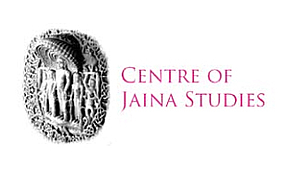
Only after some 5 years' probation could one become 'Recognized Teacher of the University' at the time.
'When he was appointed Assistant Keeper in the Library of the India Office he continued his work on Prakrit under my direction. The outbreak of the war prevented the completion of this work' (Turner 11.5.1951).
Williams worked first for the Postal Censorship Department, Uncommon Languages Section, and then as head of the East European Section of the Monitoring Service at GHQ Middle East in Cairo.
'Though for some time after the war Mr. Williams felt he was no longer fitted for academic life, it was a view which I did not share, and in 1949 I persuaded him to accept a lectureship at the School. (...) Mr. Williams is modest about his very considerable attainments. I have found him always a man of solid and dependable character whom I grew both to like and admire. (...) I understand that though his period of service in the India Office Library as Assistant Keeper was short he was, after the war, offered the post of Librarian of the India Office in succession to Dr. Randle, but that he refused at the time for the reason I have indicated above' (Turner 11.5.1951).
Turner (11.5.1951) recommended Williams to Malaya University. On 23.3.1962, before his resignation, SOAS also approved Williams's application for Research Leave Overseas in India for the Session 1962-63. But it is not clear whether he ever travelled to India
During this period, according to Brough (21.2.1962), in addition to teaching undergraduate students in Sanskrit and Prakrit, Williams 'has also frequently assisted in the supervision of research students, and has read in particular Sanskrit and Prakrit inscriptions with them.'
'Although the literary value of the work [Maṇipaticarita] is slight, that is a characteristic which it shares with most Jaina literature, and as a part of the material which has come down to us on the more popular side of the religion, it will be extremely useful to have this work available in published form' (Brough 1958/9).
'As for the last month or so my eyesight has allowed me to read Sanskrit without painful headaches, and in fact now seems to be at last completely normal, I have been working again on a major study of Jaina temple ritual and iconography' (Williams 21.3.1964).
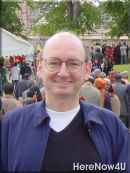 Dr. Peter Flügel
Dr. Peter Flügel